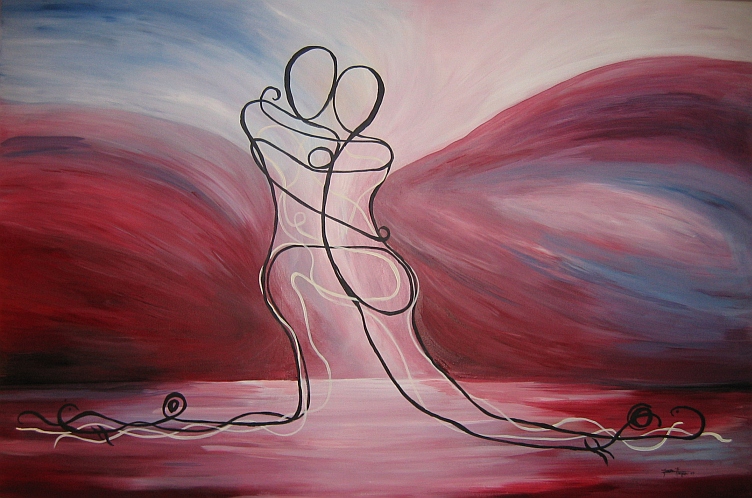Conner Habib’s series The Sex Radicals will be appearing regularly this summer on Reality Sandwich.
“There is only one power which can from within undermine egoism at the root, and really does undermine it, namely love, and chiefly sexual love…”
– Vladimir Solovyov (1853 – 1900)
First, I’ll tell you about a sweaty teenage summer by the beach. Eventually, this trip will lead me, and us, improbable as it sounds, to Russian mystic Vladimir Solovyov and his deep understanding of the body, of relationship, and of love.
Stay with me in summer; we’ll get there.
I was thirteen or fourteen the first time I looked at a man, really looked at a man. This was in Ocean City, Maryland. I’d like to tell you who I was then, but I have this strange feeling that I was not anybody. I remember that I wore black t-shirts and listened to angry music. I remember that I’d been inspired to let my hair get a little longer in the front, and to write stories. The stories were violent, everything was violent. I liked to fight with my stepfather and my mom. They were taking my sister and I, along with my older stepbrother and his friend David, on a vacation.
I wanted to be independent, so I’d walk to the beach and on the boardwalk by myself. That summer, I watched girls and their boyfriends buy clumsy, oversized t-shirts and make out and play volleyball. I felt an envy for those girls, but didn’t understand.
I’d had brief and purely curious sexual experiences with other boys and girls my age at this point – but there was no understanding of the other person’s role. It could have been anyone or even object involved. The person didn’t matter, as every morning I’d push myself into my mattress and consider the strange, warm feeling.
Waves up my chest and in my spine, a chill when I’d cum, a peaceful feeling afterward.
These were pieces of a great, weighty understanding. But they were awaiting some sort of permission to come together.
I walked from the apartment my sister, mother, stepfather and I were staying in over to my stepbrother’s and David’s place.
They were always welcoming and they seemed to me to be eternally happy, but they were probably drunk. The refrigerator had beer in it, there was beer on the kitchen counter, there were empty beer bottles in the garbage can, on the couch. It was one o’clock in the afternoon. My stepbrother was in the bedroom. David was in his bathing suit, and announced that he was going to take a shower. His pecs were thick and quietly covered in sun-lightened hairs. He was tall and had a handsome smile, though I hadn’t yet really noticed all of that. No one was gay or straight because those ideas could not yet exist for me.
Before you think: They fucked me – They didn’t. Nobody touched anyone.
I sat on the couch, and after a moment, David called to me from the bathroom.
He said, “get me a towel.”
I picked up a towel, which was still wet from the beach. It was heavy in my hand, opposing with the slowness of its weight, my racing heart, which felt as if it were sparking, starting some sort of light.
When I opened the bathroom door, there must have been the sound of the shower and he must have said thank you and I must have put the towel somewhere like on the sink or over the side of the shower door but I can’t remember any of that. All I know is that I saw, through the frosted shower door glass, his form. I looked right at him. He wasn’t distinctly visible, the occluding glass stopped him from appearing, but he was there entirely. I looked at him. I saw his form, the color of his skin, his legs, what must have been his arms, his ass. There were no clear lines, there were shapes and color. I looked at him, and saw what was there. I felt inside of me something entirely new, the coalition of light and sound and this…feeling.
No time had lapsed, but it had seemed to me there wasn’t much to my life before that moment. I walked out and more than I had wanted a brother, more than I had wanted anything, I wanted to be pressed against that frosted glass from the other side and feel his form and weight behind me, under the hot water, and then I’d be kissing him or on my knees sucking his dick.
I have no idea about the rest of the trip.
After that moment, I began to think when I masturbated, and to imagine. Instead of just the physical motion of jerking off, images began to appear in my head. My body had seized that minute in the bathroom, on the other side of glass, and imprinted it on me, changing me. There was new meaning to everything: suddenly, the world was full of men, and I’d look at them when I closed my eyes. I’d look at them and remember them and they all became brothers, they all loved me. I’d imagine them touching me and make up stories for why. Before then, I’d only had this body which would sometimes evince a different sensation if I touched it in a certain way. But after that moment with David and the frosted shower door glass, the world became different: a world where the memories of men I looked at are seen by the way my body feels.
This is how we know the mind and body are in love. One creates a story, the other feels it.
Decades later, I encountered the work of Russian mystic, philosopher, and poet, Vladimir Solovyov. His view of desire and what he called “sexual love” expressed this awakening in me, in words set down over a century and a half earlier.
Solovyov was born in Moscow in 1853, the direct and also distant descendant of intellectuals. When he was just nine years old, he writes, he encountered the Holy Spirit (or Sophia, as Solovyov and Western Esotericists refer to Her). Touched by this vision in church, where the walls fell away and only a single, glowing figure stood before him, radiating benevolence, Solovyov felt a flush of total love.
It was an experience that would occur again in his life, and that would permeate all his philosophies and poetry. Of a later encounter with Sophia, he writes
Instantly, golden azure filled the room,
And she shone before me once again —
But just Her face — Her face.
At that instant lasting bliss was born in me!
Once more my soul went blind to mundane matters.
A flush of radiant love, surging forth and then pulling away like a dream or water turning back on itself at the shore, this is the image of Solovyov’s entire philosophy.
Vladimir Solvyov was a precocious student, and quickly grew to be a respected philosopher. He took his work seriously, but not himself, casting self-deprecating humor over even his most profound experiences. His intelligence and good nature caught on with the public. By the time he was in his early twenties, he was publishing work, giving well-attended lectures, and was friends with Fyodor Dostoyevsky. Among his theorizing about the nature of knowledge and matter is a short and stunning book, The Meaning of Love. Here, Solovyov writes about the primacy of love, and in particular, sexual love.
When the few people who write about Solovyov’s write about Solvyov, they tend to go to lengths to separate what he “really” meant by sexual love from what we’d think of as sexual love today. Basically, they say, Solvyov doesn’t mean fucking; not the act of sex. Instead, they tell us, he means the powerful attraction between two people of opposite sex. Well, okay, they’re the scholars; but it’s an odd gesture, since Solovyov’s work is so deeply suggestive of the sex act, of arousal, or attraction, desire, lust, that it seems irrelevant that he didn’t expressly state this.
The world, he wrote, is constantly fragmenting. We experience separation, and this separation is real. But the world is also a unity.
“Parts of the material world,” he writes, “do not exclude one another, but, on the contrary, aspire mutually to include one another and to mingle with each other”
The world wants to find itself and merge with itself. That is longing and desire. That is why people seek to be inside one another. It’s even why gravity draws us to the earth. But instead of understanding this longing as something useful or beautiful, we prefer to ignore it in favor of a totally sealed and cut-off version of ourselves. The solution to this dissonance? Sexual love.
“There is only one power,” he wrote, “which can from within undermine egoism at the root, and really does undermine it, namely love, and chiefly sexual love. The falsehood and evil of egoism consists in the exclusive acknowledgement of absolute significance for oneself and in the denial of it for others.”
Sexual love “forces us, with all our being, to acknowledge for another the same absolute central significance which, because of the power of our egoism, we are conscious of only in our own selves. Love is important not as one of our feelings, but as the transfer of all our interest in life from ourselves to another, as the shifting of the very centre of our personal life. This is characteristic of every kind of love, but predominantly of sexual love; it is distinguished from other kinds of love by greater intensity, by a more engrossing character, and by the possibility of a more complete overall reciprocity.”
In plainer language: Love shows us that other people are real, significant, and important. And the version of love that is desiring, attracting, drawn to an other, is the most powerful of all. This love is not a state we can stay in, but a powerful teacher that arrives and departs quickly. It shows us what is possible, and then disappears, leaving us to seek it again.
Unfortunately, our attitude to this teacher is flippant. We describe it in unflattering terms: “just infatuation,” “only lust,” “shallow.” We say, “I want something more.” Neuroscientists wave it away with a magic wand: it’s merely chemical change. Nothing special about that first glance, those first three months, maybe nothing special about that love stuff at all, just matter and motion. And if someone acts on this initial attraction? We might refer to her or him as a “slut” or “desperate.” A contradiction, then: We love the initial feeling that seeing a new and beautiful person brings, but we don’t hold it in high regard. It’s not the “real” thing.
When I saw my stepbrother’s friend, my body was wiser than the rest of me, it knew things that I didn’t. Sexual love rose up as a feeling of wanting to go past the cloudy barrier and be with him. I recognized, in my separateness, the unity of things, and in my subsequent fantasies, I brought us together, imaginatively. These fantasies revealed to me that I was attracted to men, and opened up the possibility to recognize the unity I had with others.
This dance between unity and separateness is enacted whenever sexual love overtakes us. The feeling of unity that lust brings isn’t shallow, it is the real thing. Furthermore, when we’re attracted to someone initially, we will either overlook or ignore what might normally annoy us or scare us away. The draw is so strong that we experience, in the other, an idealized human being. This draw can be sustained and often is. When we see someone we’re attracted to for a second or third time, when we first start dating or after we have sex, the draw stays there. Anything that is annoying to us normally becomes endearing while this draw is sustained. The body’s will, sexual love, makes us extremely kind.
What Solovyov (and our experience) teaches us is that, far from being shallow, lust is what teaches us the highest form of love.
What if we took lust and desire seriously as a form of wisdom and meaning, not just chemical response? What if, instead of measuring it up to other experiences, we reversed our ethic and held this infatuation stage up as the standard? We would see then that it’s not that these initial feelings are false or fake, it’s that we don’t feel them enough. In other words, we aren’t normally as forgiving, adoring, or drawn to other people as we are in the initial stages of attraction. What if we were? When we stay with someone, we always seek to find our way back to that attraction. The work of fulfilling our longing, of re-achieving our lust, is the work of love. In this work, we wonder, what if we were as loving and forgiving in our lives as we were while we were initially infatuated?
What if lust is a sort of faithfulness? What if lust is the ideal of love and not the other way around?
This is a good place to stop. Lingering more in theory would be the antithesis of Solovyov’s lesson. The lesson comes not to stay, but to rush in, teach us, recede.
It is in the longing that we learn.
So instead of delving into Solovyov’s work more deeply, I end here with the words of philosopher, scientist, and occultist Rudolf Steiner (who was influenced by Solovyov). It’s a meditation on seeing another human being. Reflecting on it, Vladimir Solovyov’s work can come to life in us. If we want it badly enough.
Create for yourself a new indomitable perception of faithfulness.
What is usually called faithfulness passes so quickly.
Let this be your faithfulness: You will experience moments, fleeting moments, with the other person.
The human being will appear to you then as if filled, irradiated, with the archetype of his/her spirit.
And then there may be, indeed will be, other moments, long periods of time when human beings are darkened.
At such times, you will learn to say to yourself, “The spirit makes me strong. I remember the archetype. I saw it once. No illusion, no deception shall rob me of it.”
Always struggle for the image that you saw.
This struggle is faithfulness.
Striving thus for faithfulness you shall be close to one another as if endowed with the protective powers of angels.
*
Next Up: “Desire is the Truth of It: Jacques Lacan on Wanting Wanting“
*
Sources
Allen, Paul M. Vladimir Soloviev: Russian Mystic. Great Barrington, MA: Lindisfarne Books,
2008.
Solovyov, Vladimir. The Meaning of Love. Great Barrington, MA: Lindisfarne Books, 1985.
Steiner, Rudolf. Reverse Ritual : Spiritual Knowledge Is True Communion.
Great Barrington, MA: Anthroposophic Press, 2001.
Talbott, Steve. “Vladimir Solovyov on Sexual Love and Evolution.” Web.
http://natureinstitute.org/txt/st/org/comm/ar/2014/love_22.htm















